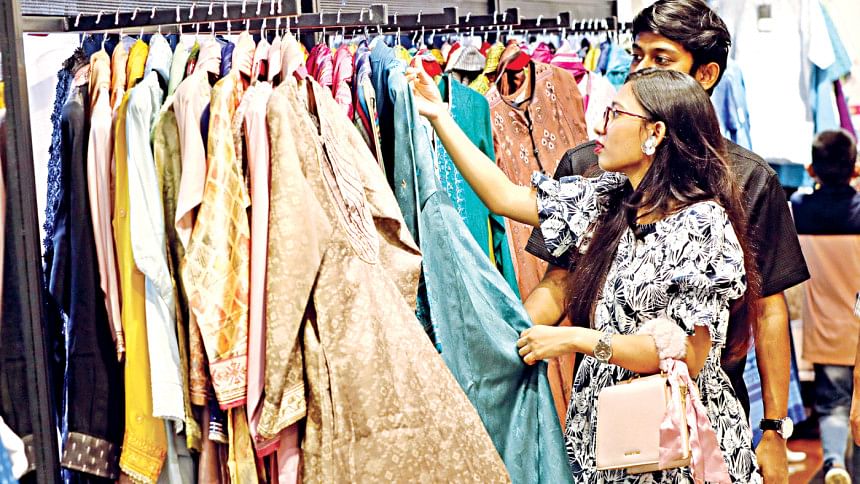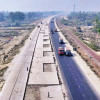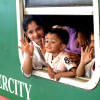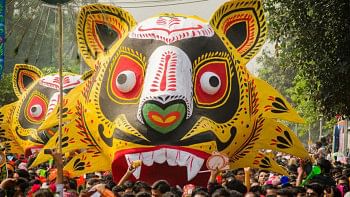How Eid moves money in the economy

As the fasting month of Ramadan draws to a close, the festive spirit is evident not just in growing contributions to charitable causes and a surge in remittances but also the infectious energy among everyday people on the streets.
Eid, a time of joy, unity, and generosity, marks the end of the holy month and serves as a major economic driver.
According to unofficial estimates, Tk 495 crore is given as "Fitr", an obligatory alms-giving for every able Muslim, with even more distributed through informal channels, especially when people return to their village homes for the celebration.
Remittances also soar ahead of the occasion, with migrant workers sending home larger sums so their families can celebrate. Bangladesh received a record $2.94 billion in remittances during the first 26 days of March, according to central bank data. The inflow was 82 percent higher than the same period last year, industry insiders said.
Mohammed Helal Uddin, a professor of the Department of Economics at the University of Dhaka, said this leads to a redistribution of wealth.
At the same time, the streets and markets of Dhaka come alive with eager Eid shoppers, all keen to complete festive purchases while retailers respond to changing trends by offering modern and affordable options to cater to a diverse range of customers.
Additionally, the Eid rush creates temporary job opportunities, with companies hiring extra staff to meet demand.
According to the Bangladesh Shop Owners Association (BSOA), business conducted before Eid-ul-Fitr amounts to around Tk 170,000 crore.
Mohammed Abu Eusuf, executive director of the Research and Policy Integration for Development, said the magnitude of the Eid economy is much bigger than anticipated.
"Around 40 percent of round-the-year transactions on food and non-food items are done during the Eid," he said. "Marginal businesses, particularly small and medium enterprises, take all-out preparations for the occasion as they get 40 percent of their yearly earnings from the Eid business."
This uptick is seen across the board.

With approximately 40-50 million passengers travelling during Eid, according to the Bangladesh Jatri Kalyan Samity, the transport sector gets a boost.
The demand for jewellery also rises, with daily sales swelling to about Tk 3 lakh from Tk 80,000, according to the BSOA.
However, the biggest boon comes for apparel retailers, with the BSOA estimating that around Tk 37,400 crore is spent on clothing ahead of Eid-ul-Fitr.
As the final days of Ramadan draw near, the excitement of Eid shopping in Dhaka intensifies. While shoppers may face challenges ranging from unpredictable weather to political changes, one thing remains constant: the desire to celebrate Eid in style, with comfort, elegance, and tradition.
Across Dhaka's upscale shopping malls and arcades, from Bashundhara City Shopping Centre to Jamuna Future Park, Karnaphuli Garden City, and Taltola Market in Khilgaon, crowds are flocking in to complete their Eid shopping.
Anisur Rahman, a staff member at Najish Fashion in New Market, observes, "Sales have been steady, with an increase in customers every day."
In particular, Pakistani garments, famed for high quality, have become the must-have item of the season, he says.
Marium Jannat, a middle-aged shopper, praises the colour and fit of Pakistani dresses, saying, "The designs are perfect, and the fabric quality is excellent. These dresses are fashionable and make us feel great, especially during the Eid."
Similar trends are visible in the wholesale markets like Islampur Wholesale Market and Polwel Super Market. Mohammad Al Amin from Top 8 Collection at Islampur Lion Tower reveals that their goods have been flying off the shelves.

"We've received 1,100 new catalogues this year, and our boutique items are especially popular," he says. "We offer a unique collection of boutique items, including party dresses, lehengas and sarees. Traders and online entrepreneurs can select items that align with the catalogues," he explained.
Md Nuruzzaman Rockey, another wholesaler from Islampur, mentioned that they recently launched a new factory in Khilgaon. This facility specialises in the production of shirts and panjabis, which are supplied to well-known local brands such as Boom, Classic, Richman, Freedom, and others.
"The products are priced between Tk 1,250 and Tk 1,350, and sales have been progressing smoothly throughout Ramadan."
Meanwhile, retailers like SaRa Lifestyle Ltd are anticipating a strong sales season, expecting a 20 percent growth compared to last year.
The company's newly launched 'Persian Tale' collection, featuring intricate Persian royal motifs combined with contemporary designs, is receiving a warm reception from customers, said Mohammad Motiur Rahman, assistant director of operations at SaRa Lifestyle Ltd.
Their collection includes sarees, three-piece sets, and denim pants for men, women, and children, with prices ranging from Tk 250 to Tk 9,990.
The collection features screen printing, sublimation printing, embroidery, embellishments, and intricate handwork, incorporating festive abstract, floral, traditional, and geometric motifs.
Fashion houses like Kay Kraft have also experienced a surge in demand, particularly for their Eid collections.
Khalid Mahmood Khan, the company's co-founder, shares that they have been receiving positive responses from customers despite a slight dip in foot traffic during the early weeks of Ramadan.
However, with Eid approaching, he expects the crowds to pick up.
Yellow, one of the leading popular brands in Bangladesh, has also seen positive results this season. With 17 stores across the country and a robust online presence, Yellow has launched over 1,500 new Eid styles, keeping up with the growing interest in fashion.
"We are confident in our sales and expect to exceed our targets by Chand Raat," said an official from Yellow, who wished to remain anonymous.
Despite the growing sales, some market participants have observed a slight shift in consumer behaviour this year.
Towhid Chowdhury, director of Easy Fashion Limited, notes that while business has been steady, customers this year have gravitated towards more muted tones and lighter fabrics, likely due to the intense summer heat.
"Our cotton fabrics have been particularly popular, as they provide comfort and breathability," he explains.
Like other lifestyle brands, Sailor has also refreshed its product portfolio to attract more customers during Ramadan. They introduced a new fabric blend of cotton and rayon, allowing customers to wear the garments without the need for ironing, explained Aviaz Islam Shuvo, the branch manager at Sailor's Khilgaon outlet.
Ameera Haque, a middle-aged woman from West Rajabazar, visited Bashundhara Shopping Mall with her five-year-old son, Reshad Rafaq, to shop for Eid. She spent time exploring Yellow's women's section, purchasing a metallic black two-piece for Tk 4,500.
She also selected a light-coloured panjabi with intricate sleeve and collar detailing for her husband, and a matching set for her son.
In the footwear sector, Apex Footwear has emerged as a leader, with Raihan Kabir, the company's marketing manager and e-commerce lead, boasting that no competitor has been able to match their success.
However, he also acknowledges a shift in shopping patterns, noting that the typical vibrancy of Eid shopping seems to be missing this year.
"While people are shopping, there's a different energy this time. It feels quieter, less festive," he reflects.
Selim H Rahman, chairman of Hatil Furniture, a popular furniture brand, said furniture sales go up 25 percent during Eid.
Another major feature of the celebrations are sweet and savoury delights, especially as the spirit of hospitality is in full swing. Around Tk 27,555 crore is spent on entertaining guests during Eid, according to the BSOA, meaning the demand for cooking spices and essentials multiplies.
Mohammad Abu Yousuf, proprietor of Raja Mosla Store at Mirpur-11 Kitchen Market, said prices of spices had not increased ahead of the Eid-ul-Fitr.
"We are selling Indian cumin for Tk 640 per kilogramme (kg), cardamom for Tk 1,350, plums for Tk 420 and cinnamon for Tk 500 per kg," he said.
"The spices at our shop are of high quality. The prices of cinnamon, cardamom, and cumin are the same as they were prior to the fasting month of Ramadan."
Khandokar Jamil Uddin, owner of Jamil Store at the same market, echoed those sentiments, saying similar items can be found at different price points depending on quality.
Parul Parveen, a customer residing at Sangbadik Abashik Alaka in Mirpur's Pallabi, was shopping with her husband Darul Huda, and said they always shop from this kitchen market as everything from daily essentials to lifestyle products are available here.
"Today I bought Eid-related goods like vermicelli, sugar, salt, plums, corn flour, baking powder and so on," she said.
However, she said that prices had been hiked slightly compared to what they were prior to Ramadan.
"For example, I bought white and red sugar at Tk 130 and Tk 140 respectively just three or four days before Ramadan. But I have bought these goods at Tk 140 and Tk 155 now," the middle-aged woman said.
"During Eid, we will eat biryani, for which we bought spices at additional prices. We will make fried chicken and vegetables using corn flour. We use spices to make eggplant fritters, potato fritters, and other fritters for iftar and sehri."
Beauty and cosmetic shops are also witnessing an avalanche of customers ahead of the Eid as women throng to stores and branded outlets across the capital city to buy make-up.
Reshma Khatun, a garments worker from Mirpur-11, came to shop with her colleagues to buy a make-up kit before leaving for her home village.
"I will not get enough time to buy these goods. Today I got a gap and came out with my colleagues. We purchased a slew of things such as bangles, earrings, laces, clips, hairbands and a make-up kit," she said.
Sarwat Simin Dina, a first-year student at Siddheswari Girls' College in Malibagh, said she visited Herlan, Flormar, and Moon's Gallery. She shared that her family would not go to their home village for Eid due to her examinations after Eid, making them very sad.
Jesmin Akhter, a staff member at Moon's Gallery, noted that the outlet has been experiencing high customer footfall so they are expecting growth.
Jahangir Alam, a makeshift vendor in Mirpur-11, said he earns at least Tk 1,500-Tk 2,000 per day by selling iftar items such as jalebi, egg chops, grammes, fritters (eggplant fritters, potato fritters), puffed rice, rissole and so one. He said his earnings exceed Tk 2,000 on Friday and Saturday.
Travel is also a huge part of Eid, with many holidaying in different destinations at home and abroad. Capitalising on this, travel agencies and airlines along with hotel and motel allure people with a range of benefits and offers and earn huge sums.
Pradip Sanyal, executive director of Bhawal Resort and Spa in Gazipur, said the lion's share of an entire year's business takes place during Eid. "Some 90 percent to 100 percent of the rooms are booked during the festival," he said.
Khandaker Golam Moazzem, senior research fellow at the Centre for Policy Dialogue, stated, "As Eid is an integral part of our lives, the sales of goods and services during this period have a significant impact on the economy.
"The sales of Eid-centric lifestyle products such as pajama-panjabi, shoes, watches, caps, prayer mats, atar, and other clothing items increase exponentially compared to other times of the year, making it a substantial business."
He said the supply chain for these products has expanded from urban centres to rural areas, further impacting the overall economy. In addition to clothing, food items also see a surge in demand.
"Eid bonuses for both public and private sector employees, alongside the additional income of business owners, drive increased earnings and spending during this period," he said.
He also remarked on the increased flow of remittance, saying, "This influx of money through various channels has a positive impact on the economy, strengthening the domestic supply chain."
He further pointed out that there is an Eid-focused business centred on imports, with goods such as clothing, shoes, oil, spices, and dates being brought in to meet heightened demand in the domestic market.
However, he said there is a disparity in the return share within the supply chain, as end-users and those at the producer level do not always benefit equally from the business. Producers at the lower end of the supply chain often fail to see the advantages, as do the end-users, he remarked.
Moreover, businesses tend to exploit the situation by inflating prices due to the lack of government regulation and monitoring.

 For all latest news, follow The Daily Star's Google News channel.
For all latest news, follow The Daily Star's Google News channel. 










Comments